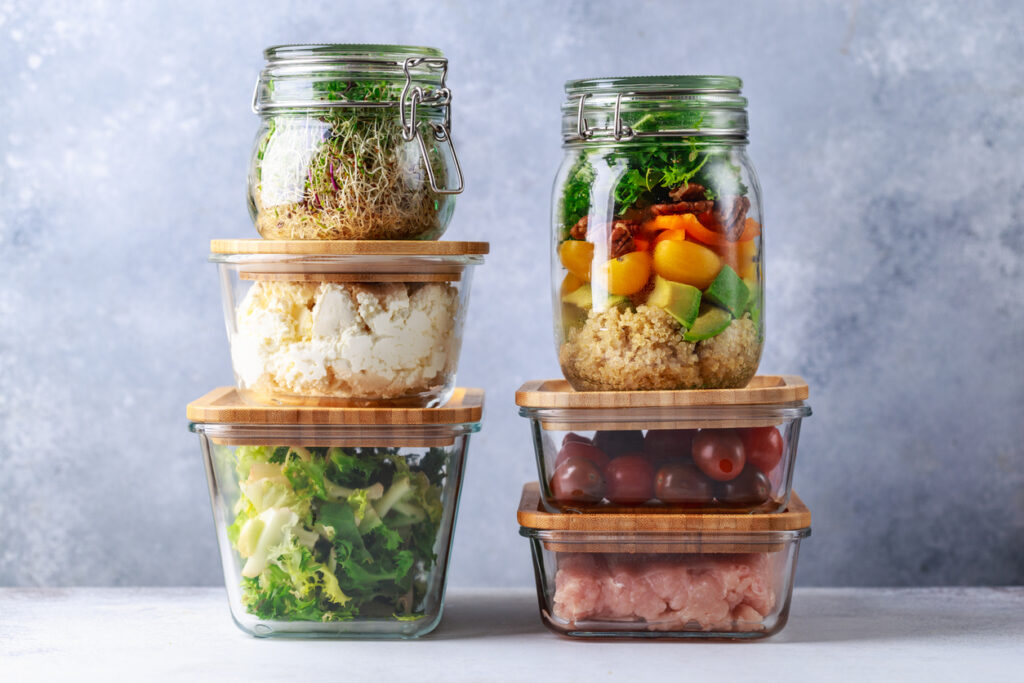If you haven’t focused on buying your fruits and veggies in-season in the past, now is the time! Buying in-season foods offers so many benefits. Some of the advantages of choosing foods that are in season include:
- Better Flavor and Quality: In-season produce is typically harvested at its peak of ripeness. This means it is more likely to be fresher and have better flavor and texture compared to out-of-season produce that may have been transported long distances.
- Nutrient-Rich: Seasonal fruits and vegetables are often more nutrient-dense because they spend less time in transit and storage. This can result in higher vitamin and mineral content.
- Supports Local Agriculture: When you buy in-season foods from local farmers or markets, you support local agriculture and the economy. This can help sustain small-scale farmers and preserve farmland in your community.
- Reduces Environmental Impact: Out-of-season produce is often grown in greenhouses or transported long distances, which can result in a higher carbon footprint. Buying in-season foods that are locally sourced reduces transportation-related emissions and energy use.
- Cost Savings: In-season produce is generally more abundant and, therefore, less expensive. You can often find good deals on fresh, local foods when they are in season.
- Variety and Culinary Inspiration: Seasonal foods encourage culinary creativity and variety in your meals. You can experiment with different recipes and ingredients as the seasons change.
- Food Safety: Seasonal foods are often subject to fewer chemicals and preservatives, as they don’t need to be stored for long periods.
Some of the foods that are currently in-season or will be in season soon are listed below.
Fall (September to November):
- Pumpkins
- Winter squash (butternut, acorn, spaghetti)
- Sweet potatoes
- Apples (from nearby regions)
- Pomegranates
- Bell Peppers
- Tomatoes (through October)
Winter (December to February):
- Citrus fruits (oranges, grapefruits, lemons)
- Leafy greens (kale, lettuce, spinach)
- Root vegetables (carrots, radishes)
- Broccoli
- Cauliflower
The following are some ideas on ways that you can incorporate these seasonal foods into your diet.
Roasted Root Vegetables:
Ingredients: Carrots, beets, radishes, sweet potatoes.
Toss these root vegetables with olive oil, garlic, and your favorite herbs, then roast them until they’re tender and slightly caramelized.
Butternut Squash Soup:
Ingredients: Butternut squash, onions, garlic.
Make a creamy and comforting butternut squash soup using roasted squash, onions, and garlic, then blend them with vegetable broth and spices.
Citrus Salad:
Ingredients: Oranges, grapefruits, mixed greens.
Create a refreshing salad with citrus segments, mixed greens, and a light citrus vinaigrette.
Pomegranate Quinoa Salad:
Ingredients: Pomegranate seeds, quinoa, cucumber, mint.
Combine cooked quinoa with fresh pomegranate seeds, diced cucumber, and chopped mint. Drizzle with a lemony dressing.
Chili with Seasonal Vegetables:
Ingredients: Bell peppers, chili peppers, tomatoes.
Make a hearty chili with a variety of peppers, tomatoes, and kidney beans. You can add ground turkey or lean ground beef for extra protein.
Baked Apples with Cinnamon:
Ingredients: Apples, cinnamon, a touch of honey.
Core and stuff apples with a mixture of cinnamon and honey, then bake until they are tender and aromatic.
Kale and Pomegranate Salad:
Ingredients: Kale, pomegranate seeds, feta cheese, walnuts.
Create a nutrient-packed salad with kale, pomegranate seeds, crumbled feta cheese, and toasted walnuts. Drizzle with a light vinaigrette.
Keep in mind that the specific benefits of buying in-season foods may vary depending on your location and the types of produce available. To make the most of these benefits, consider shopping at local farmers’ markets or joining a Community Supported Agriculture (CSA) program to access fresh, seasonal produce directly from local growers.






